Israel at war: What happened on days 42-43?
IDF deepens activity in Gaza's Al-Shifa hospital, agrees to evacuate civilians • Israel won't accept ceasefire in Gaza without mass release of hostages
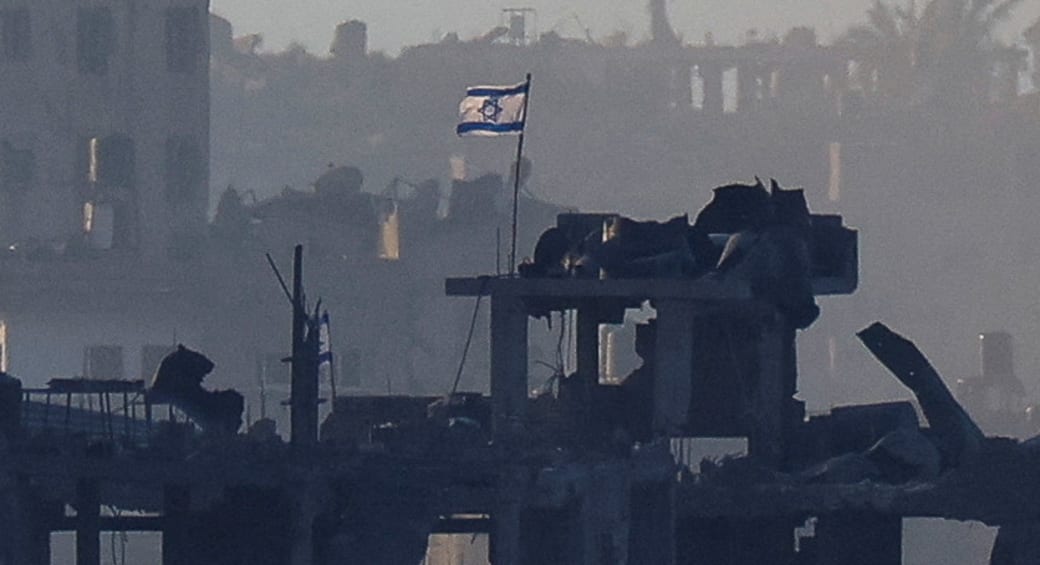

WATCH: IDF strikes Hezbollah after rocket barrage launched at Israel
The Iran-backed Hezbollah said it shot down an Israeli drone near the border in the early hours of Saturday.
Rocket sirens sounded across northern Israeli border towns on Saturday morning after a barrage of at least 25 rockets was fired from Lebanon, the IDF confirmed.
The Israeli military said it was striking the source of the fire, as well as several Hezbollah terror positions across the border.
Sirens also sounded in the northern city of Kiryat Shmona later on Saturday. The IDF said it responded to the rocket fire.
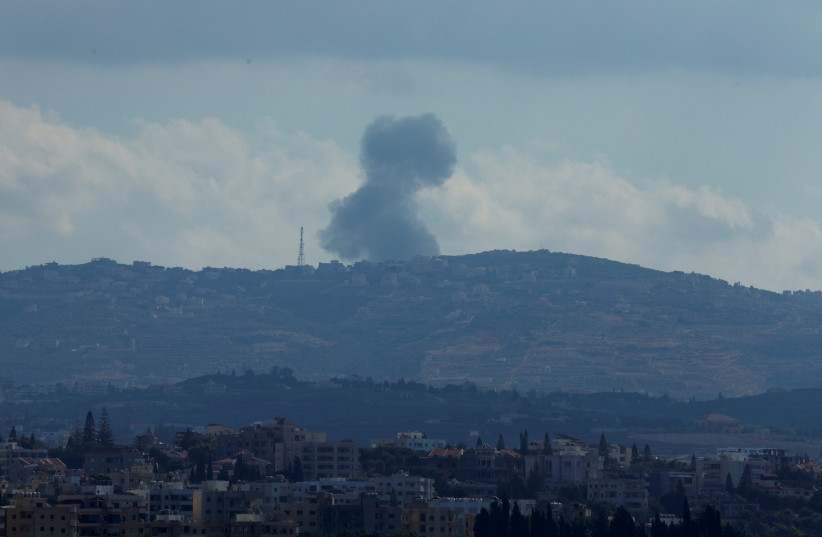
Hezbollah says it shot down Israeli drone
The Iran-backed Hezbollah said it shot down an Israeli drone near the border in the early hours of Saturday.
Lebanese officials said an Israeli airstrike hit a building in an industrial area near the town of Nabatieh, one of the deepest Israeli strikes inside Lebanese territory since fighting resumed last month. The Israeli military did not immediately comment on the incident.
Go to the full article >>Russia's Putin sees upside to Israel's war with Hamas - analysis
Putin is trying to use Israel's war against Hamas as an opportunity to escalate what he has cast as an existential battle with the West.
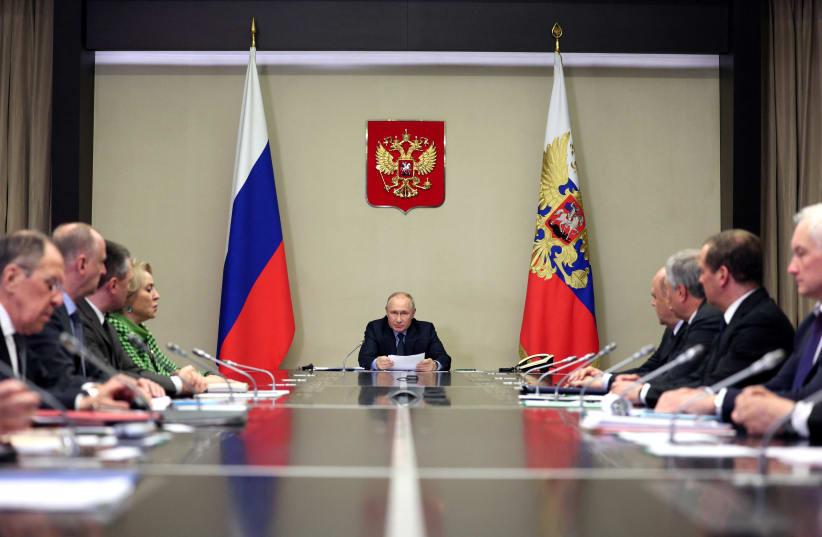
Russian President Vladimir Putin waited three days before commenting on Hamas's massacre of Israelis, which happened to take place on his 71st birthday. When he did, he blamed the United States, not Hamas.
"I think that many will agree with me that this is a clear example of the failed policy in the Middle East of the United States, which tried to monopolize the settlement process," Putin told Iraq's prime minister.
It was a further six days before Putin spoke to Israeli Prime Minister Benjamin Netanyahu to offer his condolences for the slaughter of around 1,200 Israelis. Ten days after that, Russia said a Hamas delegation was in Moscow for talks.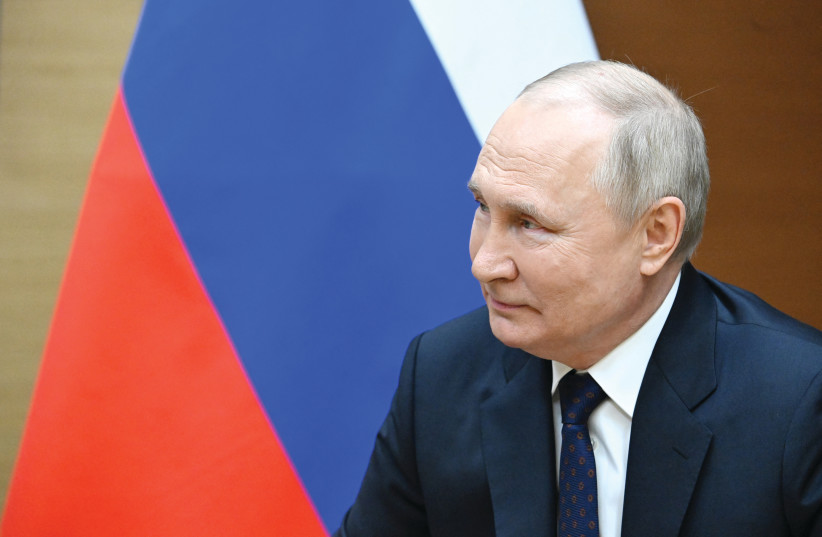
Putin, say Russian and Western policy experts, is trying to use Israel's war against Hamas as an opportunity to escalate what he has cast as an existential battle with the West for a new world order that would end US dominance in favor of a multilateral system he believes is already taking shape.
"Russia understands that the US and the EU have fully supported Israel, but the US and the EU are now the embodiment of evil and cannot be right in any way," Sergei Markov, a former Kremlin adviser, wrote in his blog, explaining Putin's need to differentiate himself.
"Therefore, Russia will not be in the same camp with the US and the EU. Israel's main ally is the United States, Russia's main enemy right now. And Hamas' ally is Iran, an ally of Russia."
Moscow enjoys an increasingly close relationship with Tehran - which backs Hamas and whom Washington has accused of supplying Moscow with drones for Ukraine which is locked in a grinding war of attrition with Russia.
Hanna Notte, a Berlin-based Russian foreign policy expert, told the Carnegie Russia Eurasia Center she thought Moscow had dropped its earlier, more balanced position on the Middle East and adopted "quite an overt pro-Palestinian position."
"In doing all of this, Russia understands very well that it aligns itself with constituencies across the Middle East and even beyond - in the Global South, in their views on the Palestinian issue where the Palestinian cause continues to resonate," she said.
It is precisely those constituencies which Putin is seeking to win over in his drive for a new world order that would dilute U.S. influence.
"The most important way in which Russia stands to benefit from this crisis in Gaza is by scoring points in the court of global public opinion," said Notte.
'DOUBLE STANDARDS'
Russian politicians have pointedly contrasted what they say is the carte blanche that Washington has given Israel to bomb Gaza to Washington's punitive response to Russia's own war in Ukraine, where it says it does not deliberately target civilians even though thousands of civilians have been killed.
Senator Alexei Pushkov said the West had fallen into a trap of its own making by exposing its own double standards over how it treated different countries depending on its self-interested political preferences.
"The unequivocal support of the United States and the West for Israel's actions has dealt a powerful blow to Western foreign policy in the eyes of the Arab world and the entire Global South," Pushkov wrote on Telegram.
Russia also sees the crisis as a chance for Moscow to try to grow its clout in the Middle East by casting itself as a potential peacemaker with links to all sides, said former Kremlin adviser Markov.
Moscow has offered to host a regional meeting of foreign ministers and Putin has said that Russia is well placed to help.
"We have very stable, businesslike relations with Israel, we have had friendly relations with Palestine for decades, our friends know this. And Russia, in my opinion, could also make its own contribution, its own contribution to the settlement process," Putin told an Arab TV channel in October.
There are potential economic benefits too, said Markov, and the added bonus of drawing Western financial and military resources away from Ukraine.
"Russia benefits from an increase in the price of oil which will result from this war," said Markov. "(And) Russia benefits from any conflict that the U.S. and EU have to devote resources to because it reduces resources for the anti-Russian regime in Ukraine."
Alex Gabuev, director of the Carnegie Russia Eurasia Center, said he believed Moscow had tilted its Middle East policy because of the war in Ukraine.
"My explanation is it's because the war is becoming the organizing principle of Russian foreign policy and (because of) ties with Iran, which brings military materiel to the table. The central Russian war effort is more important than, for example, the relationship with Israel."
WORSENING TIES
Russia's ties with Israel, traditionally close and pragmatic, have suffered.
Moscow's reception of a Hamas delegation less than two weeks after the Oct. 7 massacre angered Israel, prompting it to summon Russia's ambassador, Anatoly Viktorov, for sending "a message legitimizing terrorism."
The discontent was mutual; Alexander Ben Zvi, Israel's ambassador, has been summoned for talks with the Russian foreign ministry at least twice and the two countries' U.N. envoys have traded harsh words after Moscow's representative questioned the scope of Israel's right to defend itself.
Mikhail Bogdanov, one of Russia's deputy foreign ministers, has said that Jerusalem has stopped routinely warning Moscow of air strikes against Russian ally Syria in advance.
When a since-suspended Israeli junior minister appeared to express openness to the idea of Israel carrying out a nuclear strike on Gaza, Russia said the remarks raised "a huge number of questions" and queried whether it amounted to an official admission from Israel that it had nuclear weapons.
Amir Weitmann, chairman of the libertarian caucus in Netanyahu's Likud party, has said Israel will one day punish Moscow for its position.
"We're going to finish this war (with Hamas) ... After this, Russia will pay the price," Weitmann said in a stormy October interview with Russian state broadcaster RT.
"Russia is supporting the enemies of Israel. Afterwards we're not forgetting what you are doing. We will come, we will make sure that Ukraine wins," he said.
Go to the full article >>Israel attacks Hezbollah targets in Lebanon

IDF fighter jets struck several Hezbollah terror targets in Lebanon on Friday, including terrorist infrastructure, a weapons storage facility, and a military structure.
The Israeli military also struck a terrorist cell in the area adjacent to Arab al-Aramshe.
Attempted shooting attack near Hebron, terrorist neutralized

A terrorist opened fire at IDF soldiers stationed at Zayit Junction, in the Kiryat Arba area near Hebron on Friday morning.
The terrorist was neutralized.
This is a developing story.
IDF troops continue ground operations throughout northern Gaza, November 17, 2023
Body of soldier Noa Marciano recovered from Gaza
Hamas had released a video of 19-year old captive soldier's body, who Israel says was killed by terrorists.
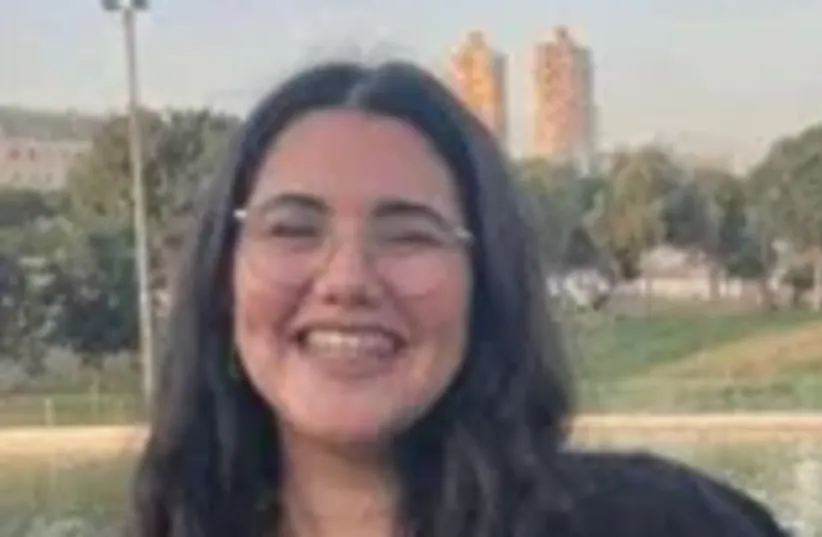
The body of Israeli soldier Corporal Noa Marciano, who was abducted by Hamas during the October 7 attacks, was brought back to Israel after being found in a structure adjacent to the Shifa Hospital in Gaza on Thursday, the IDF announced.
Following an identification process that was conducted by military medical and rabbinate personnel, IDF representatives informed her family that her body had been extracted and returned to Israeli territory.
Hamas had released a video of Marciano's body earlier in the week, claiming she had been killed in an Israeli airstrike. Israeli forces said that the evidence suggested she had been killed by Hamas.
"The IDF sends its heartfelt condolences to the family and will continue to support them," an IDF spokesperson said in a statement.
Who was Noa Marciano?
Marciano, a 19-year old from Modiin, was a member of the 414th Battalion in the Border Guard Corps. She was kidnapped by Hamas from the IDF base at Kibbutz Nahal Oz when it was stormed by terrorists during the October 7 massacre.
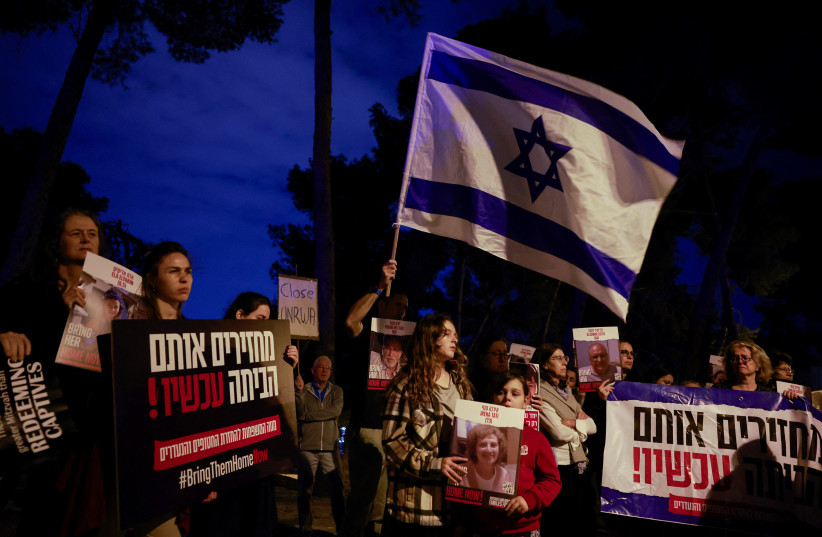
"Our hearts are with the Marciano family whose daughter, Noa, was brutally kidnapped by the Hamas terrorist organization,” the military stated. “The IDF and all the relevant bodies will continue to support her family, as well as all of the families of the hostages and missing persons. We are using all means, both intelligence and operational, to bring the hostages home.”
"The national task before our eyes is to locate the missing and return the abducted persons home. The IDF is operating alongside and in full coordination with the relevant national and security institutions in order to pursue these tasks. We will not cease from the mission until it will be completed."
Hamas continues to hold nearly 240 hostages that it kidnapped during the attacks, in violation of international law. Reports have indicated that Israel and Hamas are in talks, through Qatar, regarding a potential deal for the release of about 50 hostages in exchange for a three-day pause in fighting.
The Marciano family has been one of the leading families of hostages in their fight for the return of the abductees.
“Our children are there,” said Avi Marciano, Noa’s father, at a five-day march from Tel Aviv to Jerusalem attended by thousands calling for the release of the hostages. “You will not make a deal on your own. There will not be more than one transaction, and in this transaction you will come to talk to us. We’re done with niceties. We’re taking off our gloves and coming to fight you. Shame on you.
“We were abandoned once on the black Sabbath. We were abandoned a second time when we were informed of Noa’s death. We cannot allow the Israeli government to abandon us a third time.”
Judith Sudilovsky contributed to this report.
Go to the full article >>IDF says it is 'close to dismantling' Hamas military system in north Gaza

Israeli forces have made significant progress and are close to achieving their goal of destroying Hamas's operations in the northern Gaza Strip.
“We are close to dismantling the military system in the northern Gaza Strip," IDF Chief of Staff Herzi Halevi said.
“While there remains work to be completed, we are approaching it successfully. The IDF will continue its operations within the Gaza Strip, and as far as we are concerned, more and more regions [will be targeted], systematically eliminating commanding officers and eliminating operatives, and eradicating the infrastructure.”
IDF troops eliminate five terrorists in northern Samaria

Members of the IDF's Kfir Brigade killed 5 terrorists Thursday night who fired at Israeli soldiers in the refugee camps in northern Samaria, the IDF said in a statement.
Forces confiscated weapons, ammunition, and other military equipment. The soldiers arrested eight wanted men, one of whom was on his way to a hospital, presumably intending to hide there.
4 killed, several arrested in IDF raid on Jenin refugee camp

Israeli military forces raided the Jenin refugee camp Thursday night, killing four terrorists and arresting several wanted persons. A large amount of combat equipment was recovered as well.
Go to the full article >>At memorial for Vivian Silver, grief and a determination to pursue peace
Many speakers from diverse backgrounds described their immense pain at Silver’s death, and determination to pursue the causes to which she was devoted: peace and feminist activism.
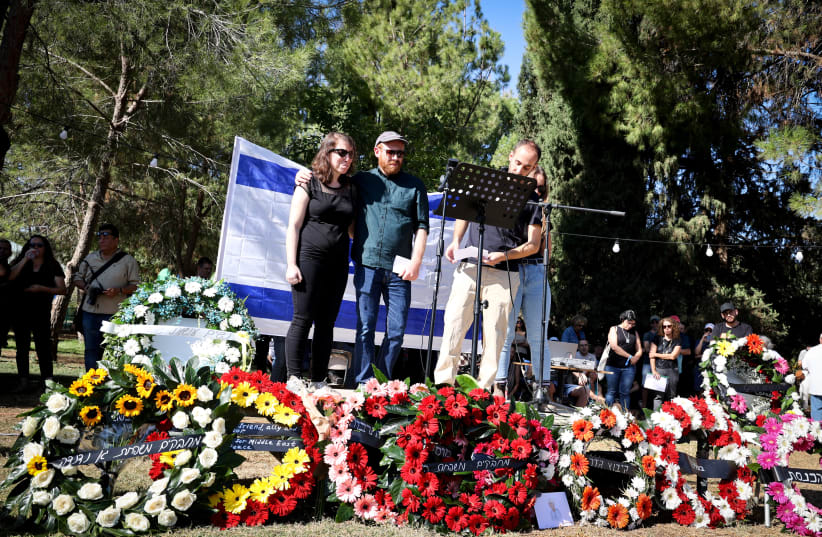
As she eulogized Vivian Silver, her friend and longtime fellow activist, Ghadir Hani said, “Vivian, my beloved, if you could hear, I would want you to know: Hamas did not murder your vision.”
Hani, who is from Hura, a Bedouin town in southern Israel, was one of several speakers at a “parting ceremony” for Silver, the Canadian-Israeli peace activist who was killed by Hamas in its invasion of Israel on Oct. 7. Many in the mixed crowd of Jewish and Palestinian women at the ceremony held each other in tears, and a friend of Silver’s from Gaza sent a written note.
Silver was previously presumed to have been held hostage, and confirmation of her death in the massacre at Kibbutz Be’eri came earlier this week. Before moving to Be’eri in 1990, Silver had lived at Gezer, in central Israel, for more than a decade.
Cars lined the road for several kilometers outside of the kibbutz, and the large crowd included current and former Israeli lawmakers, Reform and Orthodox Jewish leaders, international and local media and activists wearing shirts bearing the names of left-wing organizations including the one she co-founded, Women Wage Peace.
“It is impossible to destroy humanity, solidarity, the wish for a safe future,” Hani said in her eulogy.
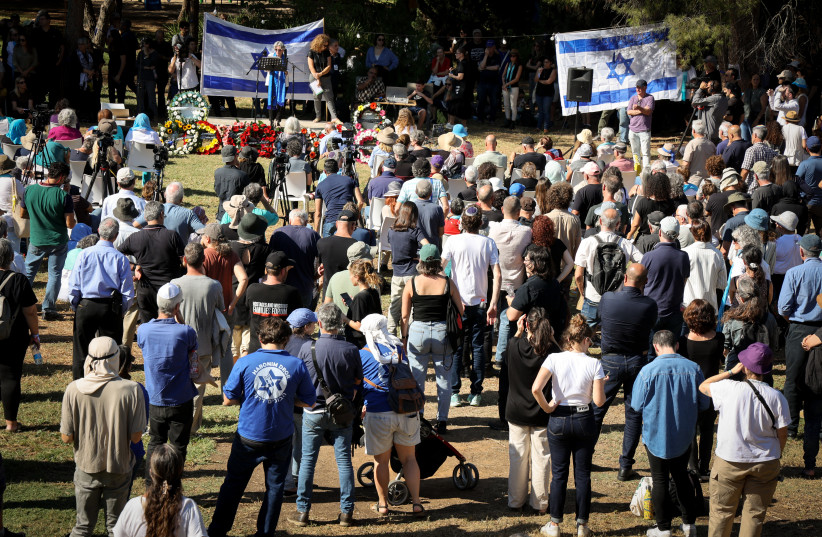
Devotion to peace
Arab-Israeli Knesset member Ayman Odeh, who leads the Hadash Party, described Silver in remarks to journalists as “the shining light of our community” and lamented that “instead of dancing together after achieving peace, she became a victim in the most horrible way.”
Dov Khenin, a longtime Knesset member from Hadash and later the Joint List, told the Jewish Telegraphic Agency that his “heart is broken” and that Vivian “was optimistic, very smiley and personable” while working together with him on many campaigns promoting Jewish-Arab partnership.
Many speakers from diverse backgrounds described their immense pain at Silver’s death, and determination to pursue the causes to which she was devoted: peace and feminist activism.
“We promise you Vivian, we will continue your path even stronger and braver, since now it is clear where the path leads to that is not the ‘way of peace,'” said Avital Brown of Women Wage Peace. Brown promised to “continue to work with our Palestinian partners and the global community of women. “
After the final speaker, members of Women Wage Peace, all wearing light blue scarves, gathered in a circle, singing Israeli folk songs and concluding with “We shall overcome.”
“You taught us the most important lesson: to be human, to see the other, the weak, the one whose voice is not heard,” said Hani, who discussed the difficulty of saying goodbye to Silver during wartime.
“I wait here without words,” she said. “We are all in shock. What would you tell us to do now? How can we continue from here?”
Go to the full article >>Israel-Hamas War: What you need to know
- Hamas launched a barrage of rockets on October 7, with thousands of terrorists infiltrating from the Gaza border
- Over 1,200 Israelis and foreign nationals were murdered as of Tuesday, and more than 5,431 were wounded according to the Health Ministry
- IDF: 239 families of Israeli captives in Gaza have been contacted, 30 of them children